"Good News" for British Pound as Cabinet Gets Behind Increasing Brexit Bill Figure, but Merkel's Uncertain Future Could also Mean Fresh Headaches for May

Above: The UK's Theresa May and Germany's Angela Merkel. (C) European Council.
News that the U.K. is set to increase its divorce settlement offer to the E.U. makes betting on the Pound an attractive prospect this week. But Merkel's weakened position in Germany could be another potential headache for the Prime Minister Theresa May.
News reports suggest the U.K. cabinet is set to back Prime Minister Theresa May's plans to increase the money on offer to the E.U. in their financial settlement on exiting the Union.
For the Pound, the outlook rests with how soon the U.K. and E.U. can move on to discussions over the future trading relationship; something the Europeans refuse to agree to until the question of how much money the U.K. will pay into the European budget in coming years is settled.
Progress on the Brexit bill is expected unlock progress in all other areas in Brexit talks and E.U. leaders will decide at a December conference whether the U.K. has yielded enough on issues concerning the Irish border, citizens rights and the divorce bill to allow talks to progress.
The U.K. is to this week push for progress on their own internal stance towards exit payments; we should soon know how much more money the country is willing to pay in order to move talks forward.
From a currency perspective, reports that the UK is willing to increase their offer - which is currently estimated to stand at about £20bn - is positive for Pound Sterling as it is suggestive that the kind of progress to push negotiations forward is likely.
"Reports that the Cabinet will back PM May's increased Brexit bill offer is indeed good news for GBP bulls," says Viraj Patel, an analyst with ING Bank N.V. based in London.
In fact, Patel makes betting on an advance in the Pound-to-Dollar exchange rate ING's "trade of the week" and eyes a target at 1.3400. It must be stressed though that this call is also dependent on Chancellor Philip Hammond delivering a well-received Budget mid-week.
Press reports suggest the U.K. could double the amount they are willing to pay to £40BN, while Chancellor Philip Hammond says the UK is "on the brink of making some serious movement forward" in Brexit negotiations.
"Sterling, we believe, should benefit more in the short term from positive Brexit news," says Robin Wilkin, an analyst with Lloyds Bank Commercial Banking.
The UK's push comes just as the German political order is thrown into chaos with talks between Chancellor Angela Merkel and two other major parties on forming a coalition government break down.
Suddenly, the UK's domestic political landscape looks more secure than that in Germany.
A note to clients from the spot trading desk at UBS says the Pound stands to benefit, for now at least, on German political instability:
"With more geopolitical risk funnelling into EUR, the shift in longs towards GBP as a relative safe haven seems like the price action thats going through the market. Until we get a clearer picture of the election risk, look to buy dips in GBP."
But, Merkel's woes could yet prove problematic for May as it might encourage the hard-Brexit element within her Cabinet to hold back on making concessions on the final figure to exploit potential German leadership uncertainty.
Collapse of German talks perfect political cover for Brexiteer ministers reulctant to up the bill - can May prevail today? https://t.co/SNHzQJuyzr
— Laura Kuenssberg (@bbclaurak) November 20, 2017
So while there are certainly positives for Sterling on the question of the Brexit bill, there are suddenly fresh risks.
At the time of writing Sterling is looking firm against the Dollar and Euro with the Pound-to-Dollar exchange rate at the top of its October-November range at 1.3264.
The Pound-to-Euro exchange rate is at 1.1240 and sits in the bottom-half if its October-November range.
Get up to 5% more foreign exchange by using a specialist provider by getting closer to the real market rate and avoid the gaping spreads charged by your bank for international payments. Learn more here.
Germany's Woes
The Euro starts the new week softer on news German Chancellor Angela Merkel's efforts to form a three-way coalition government have failed, opening the prospect of fresh elections in Europe's largest economy having to be run once more.
German Chancellor Angela Merkel’s attempts to form the “Jamaica” coalition in Germany have failed as the pro-market Free Democrat Party (FDP) walked out of talks having failed to find common ground with the environmentalist Green Party.
Former coalition partners the Social Democrat party have of course previously ruled out forming a grand coalition with Merkel's ruling CDU/CSU, suggesting there are few options left for Merkel.
"The Euro is starting the week on a fragile note," says Philip Wee, FX Strategist with DBS Group Research. "With the prospect of a strong German government diminished, it has eroded the lift that the Euro found from last week’s better-than-expected German GDP data."
But there are risks for the U.K.'s Theresa May if Germany is indeed headed back to the polls; if Cabinet ministers opt to capitalise on German uncertainty and hold back on the UK's offer we might hear more of splits in Government which would again prove erosive for Sterling.
The BBC reports Several government sources say the meeting of the Brexit strategy group could change the course of our departure and "the question to be answered on Monday could be profound."
One source tells BBC journalist Laura Kuenssberg, "people have to decide if they really want to make progress and support this prime minister, or not."
